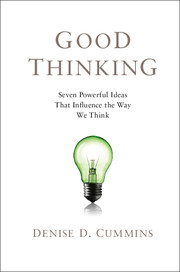One - Introduction
Published online by Cambridge University Press: 05 June 2012
Summary
After two decades of teaching bright and curious university students, I came to a disturbing conclusion: Despite our best efforts to expose students to the ideas and insights that profoundly shape the way we think and live, most students were still pretty insulated within their particular disciplines. The science majors knew all about hypothesis testing but didn’t know the first thing about moral theory. The philosophy and pre-law majors knew all about argumentation but didn’t know the first thing about scientific investigation. Outside of the business school, precious few students knew anything about decision theories that drive the equity market and underlie economic policies that impact their lives – right down to whether or not they can get student loans. And outside of the psychology majors, virtually none knew that the way the brain is wired shapes the way we think, act, and feel. And then these bright and well-educated people take jobs as policy-makers, writers, scientists, lawyers, and teachers – bumping about in life with holes where some crucial bits of knowledge ought to be.
Does this really matter? Well, consider a Colorado DUI case that ended in acquittal in spite of overwhelming evidence. “It made no sense,” the prosecutor complained. “It was an open-and-shut case. The guy’s blood alcohol level was over the limit, he couldn’t walk a straight line, and there were open beer cans in the car with his fingerprints on them.” So why was the defendant acquitted? “I talked to one of the jury members after the verdict,” the attorney reported, “and he said there was an astrologer among them. She cast a chart and argued that, according to the chart, the defendant couldn’t have been driving drunk that day. So they couldn’t get a majority past reasonable doubt,” he sighed.
- Type
- Chapter
- Information
- Good ThinkingSeven Powerful Ideas That Influence the Way We Think, pp. 1 - 4Publisher: Cambridge University PressPrint publication year: 2012



